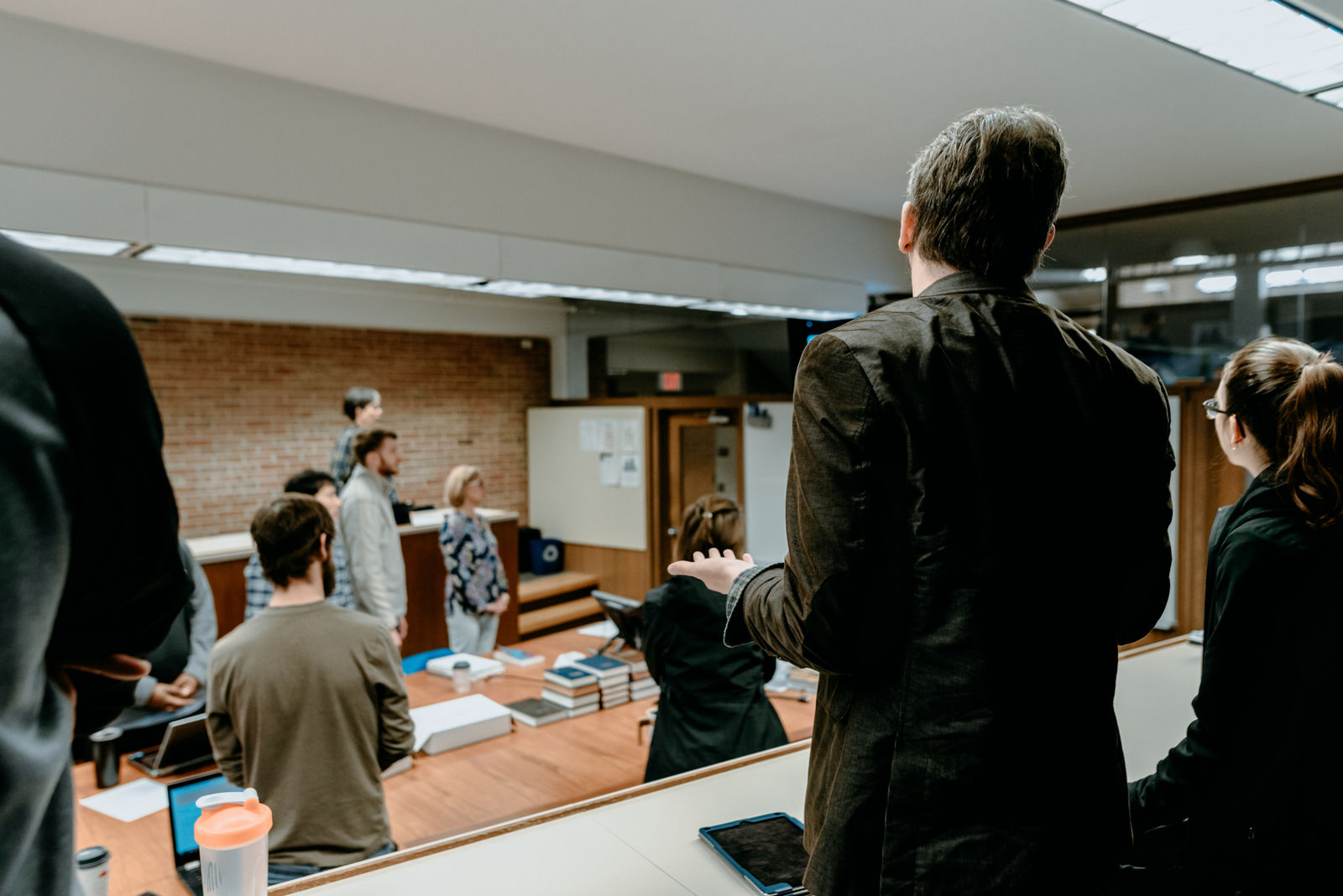Doctor of Philosophy (PhD)
What Is a Doctor of Philosophy?
A doctor of philosophy, also known as a PhD, is a doctoral degree in a specific area of study. At Calvin Theological Seminary, this terminal degree is available in the area of theology.
What Is a Theology PhD Program?
Calvin Theological Seminary’s PhD focuses on Christian theology. The graduate program leading to the Doctor of Philosophy (PhD) degree is designed to afford students advanced training in independent inquiry, academic research, critical analysis, and scholarly writing as they define their own theological positions in dialogue with other points of view. It is aimed at equipping scholars from all parts of the world for teaching and research in colleges, theological seminaries, and universities and for general ecclesiastical leadership.
Theology Doctorate Career Opportunities
A PhD can prepare you for many roles, including:
- Professor: Share your knowledge through undergraduate- or graduate-level teaching.
- Pastor-Scholar: Help lead a congregation and a denomination as a pastor who engages with and produces scholarship that feeds the church.
- Author: Curate your learning and research through written works.
- Center or institute staff: Serve as a leader for a faith-based center, institute, think tank, or other organization that values theology.
Our PhD in Theology Program
Seminary PhD Concentrations
PhD concentrations are offered in the History of Christianity, Moral Theology (Ethics), New Testament, Philosophical Theology, and Systematic Theology.
- History of Christianity: If you love studying history and the life of the global church, this concentration offers you a deeper study of the development of Christian communities and Christian thought over time.
- Moral Theology (Ethics): For students who have a passion for ethical living, personally and communally, this concentration offers a philosophical and practical look at moral theology.
- New Testament: Does the life of Jesus, and the acts of the early church, excite you? Do you pore over Scripture with an eagerness to understand more deeply? This concentration offers an up-close look at the New Testament of God’s living Word.
- Philosophical Theology: If you are drawn to the work of thought-provoking authors throughout time, energized by philosophical conversations with your peers, and curious about the implications of philosophy for the church and the world, this concentration is your key to open doors of the mind.
- Systematic Theology: What is theology? Why does it matter? How can we respond to basic questions about the Christian faith? What is the story being told in the whole of Scripture? Explore these questions and more through the systematic theology concentration.
Theology PhD Coursework
Students are required to complete a total of twelve PhD courses for credit in biblical or theological content areas. Full-time students take six courses per year (typically three per semester) for two years. Part-time students take either four courses per year for three years or three courses per year for four years. At least three courses must be taken in the student’s discipline of specialization and at least two courses in each of the other three areas.
In addition to the twelve required PhD courses in biblical and theological content areas, students in the program must take seminar 9103RP, “Teaching & Student Formation,” during the first two years in the program and are expected to take seminar 9102RP, “Dissertation Seminar,” if they have completed the required PhD courses and are working on their dissertation. Students ordinarily will take the dissertation seminar during more than one semester. These seminars are offered on a credit/no credit basis and do not count toward the twelve required courses in the program. Students living outside of the Grand Rapids area can join by video call.
Learning in the Reformed Tradition
Calvin Seminary is committed to the confessional and theological standards of the Christian Reformed Church in North America (CRCNA), but students from all Christian traditions are welcome to apply. The academic freedom to probe the foundations of Reformed theology and to explore the validity of other approaches is a fundamental assumption of the PhD program.
Get Your Theology Doctorate in Michigan
The residential PhD program allows you to learn in our newly remodeled smart classrooms alongside your peers and mentors. Experience true community, below-market housing (optional), and a vibrant city at your fingertips.
Academic & Vocational Support
As an option, PhD students may use the services of the Vocational Formation Office, including formation groups with peers and personal assessment tools such as the Birkman.
Finishing Your PhD
How Long Does a PhD Take?
The PhD program at Calvin typically takes between 4–5 years to complete.
Program Details and Requirements
In addition to this summary of the PhD program, further details and requirements can be found in the PhD Handbook.
Program Outcomes
PhD graduates will leave the program with the following skills and competencies:
- Academic research skills
- Critical analytical skills
- Scholarly writing skills
- Ability to teach across the entire field of biblical and theological studies, with mastery of one biblical or theological discipline
- Ability to provide thoughtful, fair, and respectful analyses and interpretations of positions with which they agree and of positions with which they disagree
- Ability to articulate their own biblical and theological positions and engage in informed, respectful dialogue with other points of view
- Understanding of and appreciation for Christian thought from around the world and from diverse points of view
- Ability to strengthen the church’s biblical and theological understanding and its ministry, including the ministry of proclaiming the gospel and discipling believers for Christ-like service in everyday life
What Makes the PhD Program at Calvin Different from Other Seminary PhDs?
- International learning community: Calvin Seminary offers an international community of Christian scholars eager to learn from one another. Calvin is a truly global community, with students coming from over 20 countries around the world. Over 30% of students come from outside the United States and Canada.
- Reformed: Calvin Seminary is a learning community in the Reformed Christian tradition that forms church leaders who cultivate communities of disciples of Jesus Christ. Here you will receive a thorough grounding in confessional Reformed thought.
- Diverse scholarly literature: The program helps develop an awareness and appreciation of scholarly literature representing diverse points of view in the worldwide church today and of ways in which cultural and religious contexts challenge and enrich theological education.
- Know your Christian history: Students will learn about key figures and issues in the history of Christian thought and throughout church history.
- Solid methodology: The Calvin Seminary PhD program teaches and practices a solid methodology of theological research. You will be introduced to proper research methods and their application as well as to important theological issues and developments.
- Broad range of biblical and theological topics: Calvin Seminary enables teaching competency across a variety of biblical and theological topics through a broad range of coursework and comprehensive examinations. In addition, each PhD concentration provides depth and breadth of learning in a specific area.
- Insightful pedagogy: The PhD program offers instruction in pedagogy that provides insights, skills, and practice in teaching. Courses are innovative and engaging, built on the learning and expertise of world-class professors.
- Supportive community: At Calvin Seminary, you will find a supportive community from the first course to the last chapter of the dissertation. Faculty, staff, and fellow students are here to support you throughout your seminary journey.
- Significant financial support: Calvin Seminary PhD students will find substantial financial support and options for reasonable living expenses. You are guaranteed to receive tuition support between 25% and 100%.
Library and study space resources: Calvin Seminary offers high-quality literary resources and study space. Here you will discover Hekman Library—the largest private library in Michigan, and home to an entire floor of resources devoted to theology, biblical scholarship, and ministry practices.
How to Apply
Begin the journey to your potential PhD by applying now and submitting supplemental materials. Our application process will walk through the items you need to submit, and our Enrollment Management team is available for help and questions along the way.
Calvin Seminary offers a wide range of scholarships and other financial assistance. In fact, in recent years, nearly $1.5 million in scholarship funds were awarded annually.
Application Requirements
Admission Deadlines
The deadline for PhD application materials to be submitted is January 15.
The PhD program has one start date: the Fall Semester. Admitted students will typically be required to be on-campus for an orientation in mid-August.
Frequently Asked Questions (FAQs)
Apply Now
Start your PhD journey today when you apply now.
Get to Know Calvin Theological Seminary

Meet Your Faculty
Faculty at Calvin Theological Seminary carry out the seminary’s mission as inspiring thought leaders, invested teachers and mentors, and committed followers of Christ.

Student Stories
Past graduates have applied their learning to a variety of ministry-based opportunities. Here are some of their stories.

Academic Support
In addition to contextual learning, the Vocational Formation Office offers students other forms of support, including formation groups with peers, vocational mentors, and assessment tools to help students identify and cultivate their strengths.
